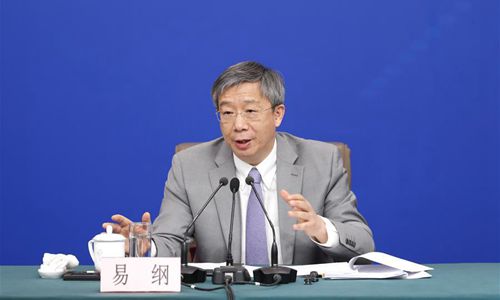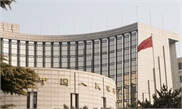PBC head re-asserts China’s ability to manage financial risks and crack down on illegal operations

Governor of the People's Bank of China Yi Gang attends a press conference on the financial reform and development for the second session of the 13th National People's Congress (NPC) in Beijing, capital of China, March 10, 2019. (Photo:Xinhua)
The head of China's central bank, Yi Gang, has again stressed that China will rein in potential financial risks and prevent the country's macro leverage ratio from rising too fast, sending a signal that China should retain financial stability and risk control as its top priorities in the next year, according to Chinese economist.
In an article written by Yi which was published on the official website of the People's Bank of China (PBC), China's central bank, he said that China should let finance support the real economy, but should at the same time look out for potential systematic risks arising from a rapid surge of macro leverage.
"It's an appropriate choice for China to keep its macro leverage generally stable, including stabilizingthe economy, real estate prices and expectations," he said, adding that China will keep "normal" monetary policies for a long period, and would avoid too-strong macro policy stimulation.
Yi also stressed that financial companies must hold licenses to operate, and that the country would crack down on illegal fundraising, lending or financial fraud activities.
Xi Junyang, a professor at the Shanghai University of Finance and Economics, said that Yi's article sends a signal that China won't relax its policies around financial risk or debt accumulation controldespite economic challenges, and the direction of financial stability won't change in the next few years.
"China is likely to further lower the macro liability level next year, given that China's general economy has largely shrugged off the impact of COVID-19 and the government has been mounting efforts to manage leverage risks in recent years, but I think it's more likely to be policy fine-tuning," Xi told the Global Times.
According to Xi, China won't sacrifice risk control for economic stimulation, and that won't change in the near term.
Yi also stressed in the article that China will further push financial opening up to develop equity financing, such as by speeding up registration-based securities issuance reforms, supporting development of private equity investment, and expanding opening up in finance management, health insurance and elderly care.
Xi said that China might further expand the registration-based IPO reforms to the small and medium enterprise board next year, but added that overall, China's financial opening-up reforms will be gradually implemented to prevent risks.


